Understand the Importance of a Carfax Report
Investing in a Carfax report is a small but crucial expense for the peace of mind it offers. It enables buyers to negotiate more effectively, avoid purchasing problematic vehicles, and make the best choice for their needs and budget. Don’t overlook this critical step in the car-buying process—a Carfax report is key to securing a trustworthy vehicle.
Looking for a Cheap Carfax Alternative?
Don’t let uncertainty cloud your used car buying experience. Enter a VIN below and get the comprehensive vehicle history report you need at an affordable price. Your next car purchase deserves the best information available.
How does a Carfax Report Work?
- Data Collection: Carfax gathers information from thousands of sources, including state DMVs, auto auctions, service facilities, and insurance companies. These sources provide details about the vehicle’s history, such as registration records, reported accidents, service and maintenance records, mileage readings, title information, and more.
- Data Integration: The collected data is compiled and integrated into the Carfax database, creating a comprehensive record for each vehicle. This data is continuously updated to ensure the report reflects the latest information available.
- Report Generation: When a Carfax report is requested for a specific vehicle, the system retrieves the relevant information from the database and generates a report. This report presents the vehicle’s history in a structured format, making it easy for users to understand and assess the vehicle’s condition and background.
- Report Content: A Carfax report typically includes details such as the number of previous owners, accident history (including reported damage and severity), service and maintenance records, title information (including salvage or rebuilt titles), odometer readings, vehicle specifications, and sometimes information about recalls or safety issues.
- Accessing the Report: Carfax reports are available through various channels, including online platforms, dealerships, and some classified listings. Users can access the report by providing the vehicle identification number (VIN) and paying a fee, although some sources may provide free access to Carfax reports.
What information does a Carfax report contain?
Obtaining a Carfax report on a used car you are considering purchasing will help you understand the condition and potential issues of the vehicle you are considering. This can help you make an informed decision about whether or not to buy the car and at what price.Disclaimer: This Carfax Vehicle History Report is based only on information supplied to CARFAX and available as of 4/26/23 at 10:41:10 PM (CDT). Other information about this vehicle, including problems, may not have been reported to CARFAX. Use this report as one important tool, along with a vehicle inspection and test drive, to make a better decision about your next used car.
A Carfax report typically includes the following sections:
History-Based Value Report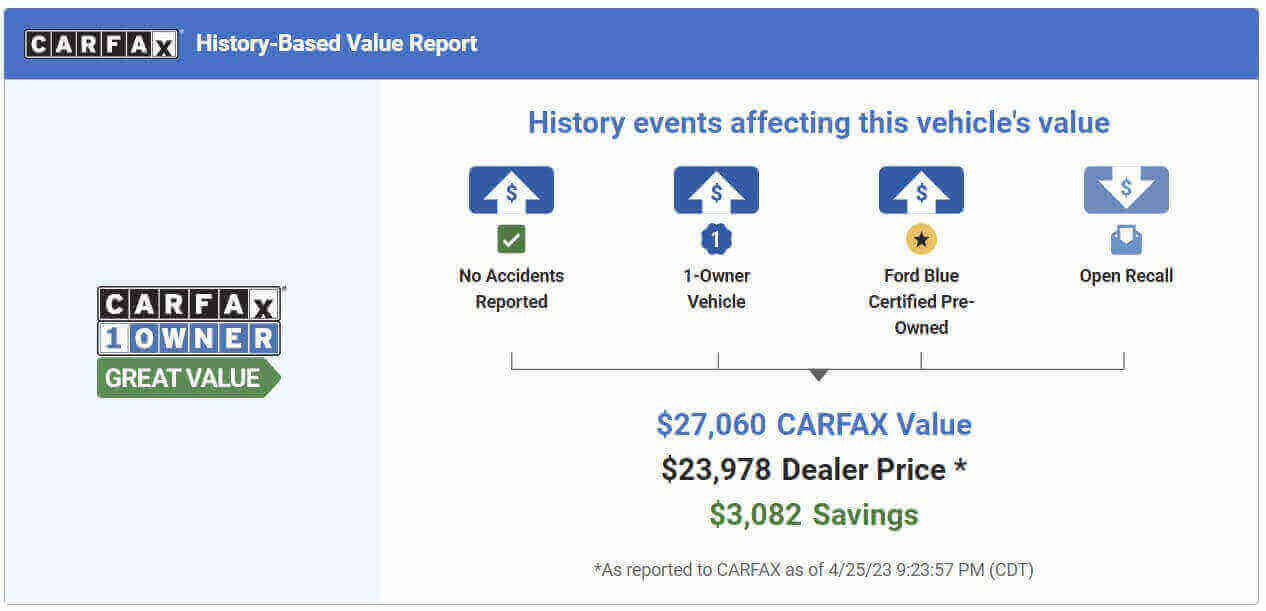
The History-Based Value Report is calculated using a proprietary algorithm that takes into account various factors, such as the vehicle’s age, mileage, condition, and location.
Under the History-Based Value section of a Carfax report, you can typically find the following information:
- Value range: This shows the estimated range of the vehicle’s value based on its condition, mileage, and other factors.
- Mileage adjustment: This section shows how the value of the vehicle may be adjusted based on its mileage. Generally, vehicles with lower mileage will have a higher value than those with higher mileage.
- Condition adjustment: This section shows how the value of the vehicle may be adjusted based on its overall condition. Vehicles in excellent condition will have a higher value than those in fair or poor condition.
- Regional adjustment: This section shows how the value of the vehicle may be adjusted based on the local market conditions in the area where the vehicle is being sold.
Vehicle History Report
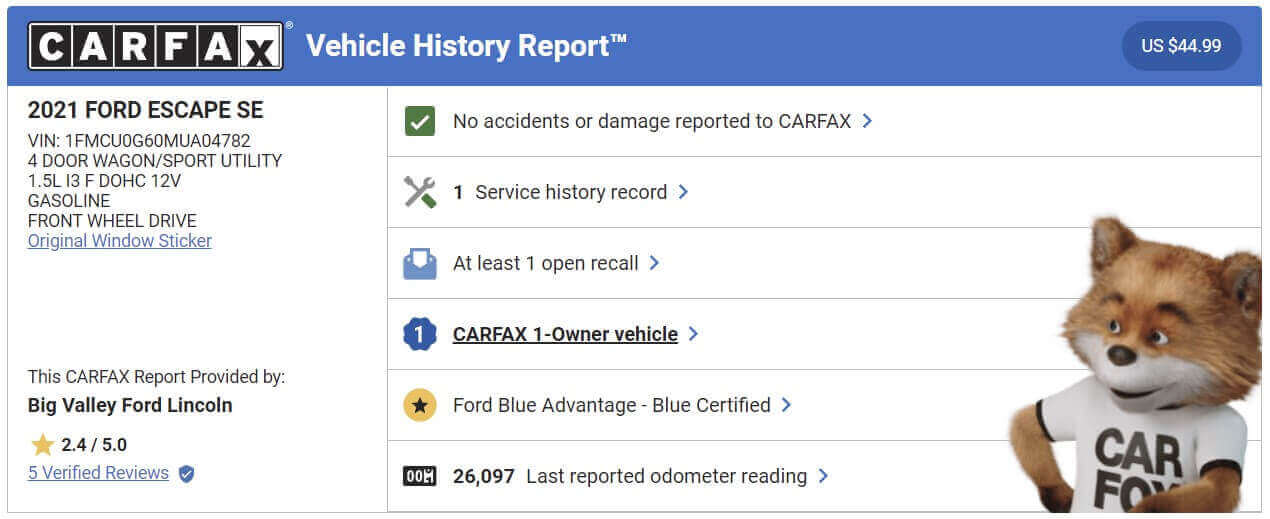 Under the “Vehicle History Report™” section of a Carfax report, you can typically find the following information:
Under the “Vehicle History Report™” section of a Carfax report, you can typically find the following information:
- Accident history: This section shows any accidents or damage reported to Carfax for the vehicle. This may include information on the severity of the damage, the date of the accident, and whether the airbags were deployed.
- Title information: This section shows the history of the vehicle’s title, including any changes in ownership, whether the vehicle has a clean or branded (salvage, flood, etc.) title, and the state where the title was issued.
- Service history: This section provides information on any maintenance or repairs performed on the vehicle, including the date and type of service, as well as the service provider.
- Odometer readings: This section shows the recorded odometer readings for the vehicle, which can help verify the vehicle’s mileage and detect any potential odometer fraud.
- Vehicle use: This section shows information on how the vehicle was used, such as whether it was used as a rental car, fleet vehicle, or personal vehicle.
- Lemon history: If the vehicle has been reported as a lemon (meaning it has had recurring issues that were not resolved by the manufacturer), this section will provide details on the lemon history.
- Recall information: This section shows any outstanding recalls that have been issued for the vehicle by the manufacturer.
- Warranty information: If the vehicle is still under warranty, this section will show the details of the warranty coverage.
- Detailed vehicle information: This section provides a detailed description of the vehicle, including the year, make, model, and VIN (vehicle identification number), as well as information on the engine, transmission, and other important features
Ownership History
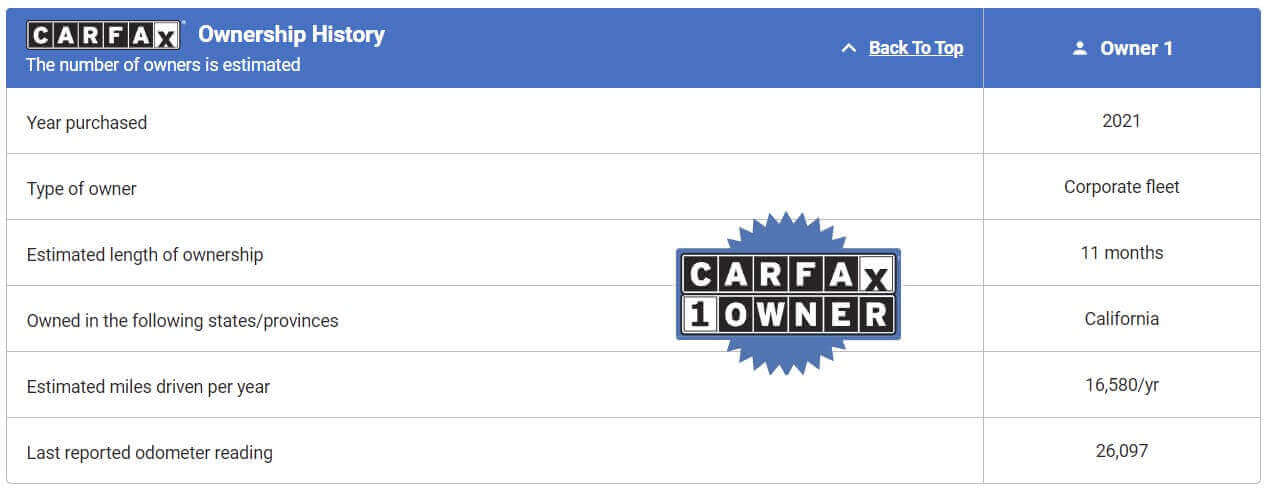 Under the “Ownership History” section of a Carfax report, you can typically find the following information:
Under the “Ownership History” section of a Carfax report, you can typically find the following information:
- Number of owners: This section shows how many previous owners the vehicle has had, as reported to Carfax.
- Length of ownership: This section provides information on how long each previous owner owned the vehicle.
- Location of ownership: This section shows where the vehicle was registered during each ownership period, including the state and city.
- Usage type: This section shows how the vehicle was used during each ownership period, such as personal use or commercial use.
- Mileage: This section shows the mileage on the vehicle at the time of each ownership transfer, which can help verify the vehicle’s mileage and detect any potential odometer fraud.
Title History
 Under the “Title History” section of a Carfax report, you can typically find the following information:
Under the “Title History” section of a Carfax report, you can typically find the following information:
- Title issues: This section shows any issues with the vehicle’s title, such as salvage, rebuilt, or flood damage titles. It can also show if the vehicle has a lien or if it has been reported as a stolen vehicle.
- Title transfers: This section shows the history of title transfers for the vehicle, including the date of each transfer, the state where the transfer occurred, and the name and address of the buyer and seller.
- Odometer readings: This section shows the odometer readings reported to the state DMV at the time of each title transfer, which can help verify the vehicle’s mileage and detect any potential odometer fraud.
- State of title: This section shows the state where the vehicle was titled at the time of each transfer.
- Title brands: This section shows any title brands that have been applied to the vehicle, such as “flood damage” or “salvage.” These brands can affect the vehicle’s value and may also impact the ability to register or insure the vehicle.
Additional History
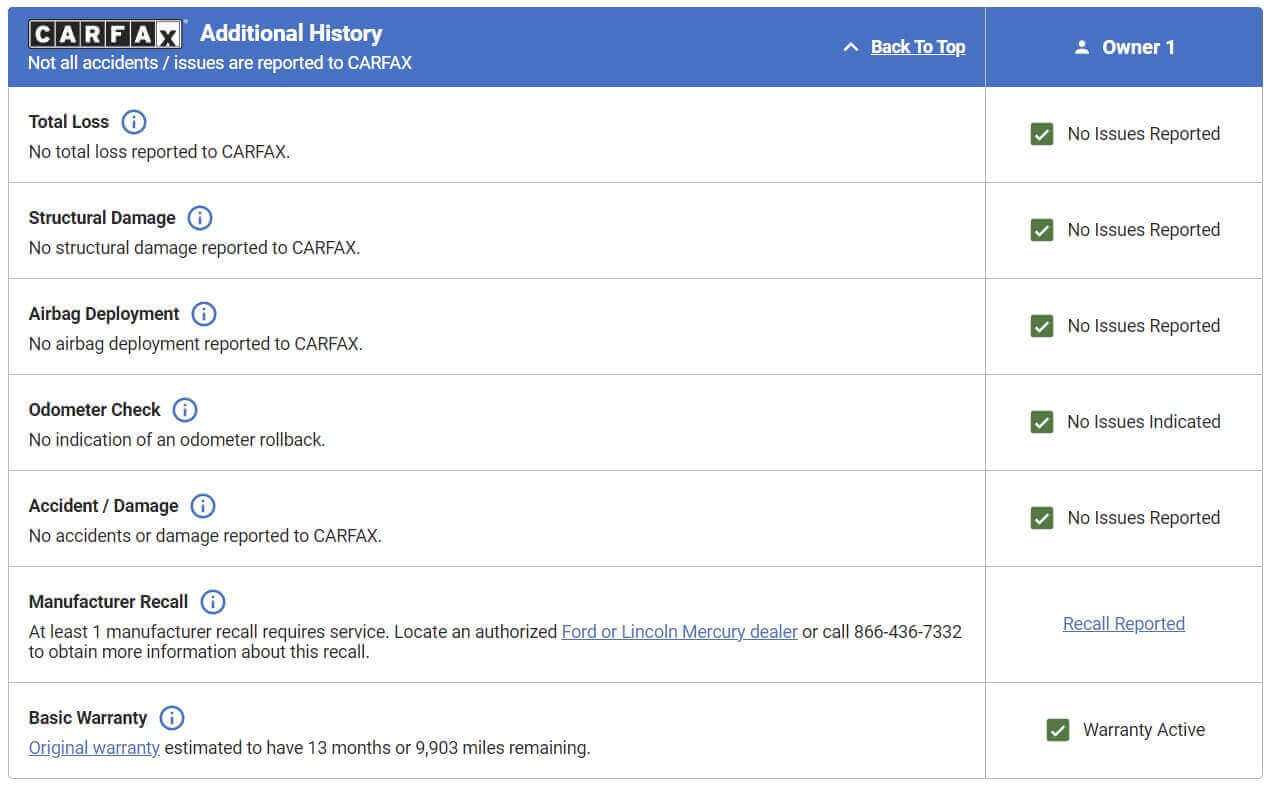 The “Additional History” section of a Carfax report provides important information about the vehicle’s history of accidents and damage. It includes details about any reported incidents, including the date and location of the event, the severity of the damage, and the extent of any repairs that were made. This section also includes information about airbag deployment, which can indicate the severity of a collision.
The “Additional History” section of a Carfax report provides important information about the vehicle’s history of accidents and damage. It includes details about any reported incidents, including the date and location of the event, the severity of the damage, and the extent of any repairs that were made. This section also includes information about airbag deployment, which can indicate the severity of a collision.In addition to accident and damage information, this section may also include information about the vehicle’s warranty status. If the vehicle is still under warranty, this section will provide details about the warranty coverage, including the remaining time and mileage. This can be important for buyers who want to ensure that the vehicle is covered in case of any unexpected repairs.
The section may also include information about any open manufacturer recalls that need to be addressed. This can be important for buyers who want to ensure that the vehicle is safe and up to date on any necessary repairs. By reviewing the Accidents & Damage section of a Carfax report, buyers can get a better understanding of the vehicle’s history and any potential issues that may affect its value or safety.
Detailed History
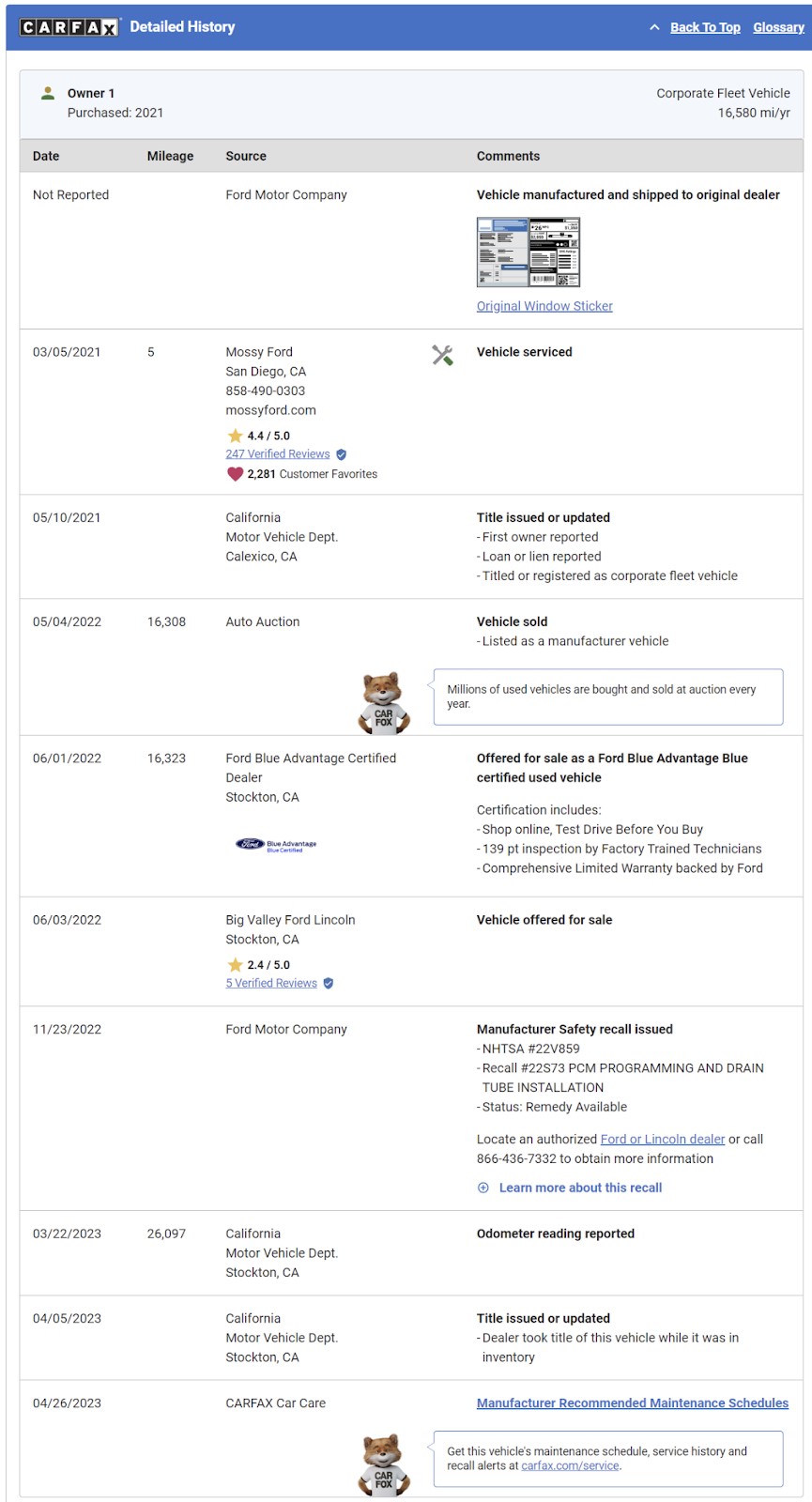 The overall timeline section of the Carfax report provides a chronological list of all the key events that have occurred throughout the vehicle’s history. This timeline may begin with the first pre-delivery inspection at a new-car dealership and can include subsequent sales, purchases, accidents, service visits, emissions and safety test results, and vehicle loans (often called liens).
The overall timeline section of the Carfax report provides a chronological list of all the key events that have occurred throughout the vehicle’s history. This timeline may begin with the first pre-delivery inspection at a new-car dealership and can include subsequent sales, purchases, accidents, service visits, emissions and safety test results, and vehicle loans (often called liens).By reviewing the overall timeline, buyers can get a better understanding of the vehicle’s complete history and track the progression of the vehicle over time. This can help them identify any potential issues or concerns that may impact the vehicle’s value, safety, or reliability.
For example, if a vehicle has reported accident damage, the “Detailed History” section may provide additional information about the severity of the damage. This may include a Damage Severity Scale that indicates how severe the damage was and where on the vehicle it occurred. This information can be valuable for buyers who want to know the extent of any previous damage and how it may have been repaired.
Overall, the Carfax report’s detailed history section can provide a comprehensive overview of the vehicle’s past, giving buyers confidence in their purchase decision and helping them make an informed choice about a vehicle’s suitability for their needs.
Is Carfax Reliable? How Accurate Are Carfax Vehicle History Reports
Carfax is one of the most popular vehicle history report providers in the United States, and their reports are widely used by car buyers and sellers. While Carfax reports can be a valuable tool for assessing the history and condition of a used vehicle, their accuracy can vary depending on a few factors.Carfax obtains vehicle history information from a variety of sources, including state DMVs, insurance companies, and repair facilities. However, not all incidents involving a vehicle may be reported to Carfax , so their reports may not provide a complete picture of a vehicle’s history. For example, if an accident or repair was not reported to the insurance company, it may not show up on the Carfax report.
In addition, Carfax reports are only as accurate as the information that is entered into their database. If a mistake is made when entering a vehicle’s VIN or other data, it can result in inaccurate information on the report.
Where Does Carfax Get The Info For Vehicle History Reports?
Carfax gets the information for its vehicle history reports from a variety of sources, including:- DMV (Department of Motor Vehicles) and state agency records: Carfax obtains information from state and local government agencies, including DMV records, to track vehicle registration and ownership history.
- Insurance companies: Carfax receives information from insurance companies regarding accident claims and repairs.
- Auto auctions: Carfax obtains information on vehicles that are sold at auction, including their condition reports and sale prices.
- Repair facilities: Carfax receives information on repairs and maintenance from authorized dealerships and independent repair facilities.
- Police reports: Carfax obtains information on accidents and thefts from police reports.
- Manufacturer records: Carfax may also obtain information from manufacturers regarding recalls, warranty work, and other service history.
Why CARFAX Vehicle History Reports May Not Tell the Whole Story
Carfax vehicle history reports are undoubtedly a valuable tool for consumers looking to purchase a used vehicle. However, it’s important to note that these reports may not always provide a completely accurate picture of a vehicle’s history. Despite the extensive resources available to Carfax , the company relies solely on information that is reported to them by various sources. Any incidents that go unreported will not show up on the report, leaving potential buyers with an incomplete view of the vehicle’s past.In some cases, this lack of information can be significant. For example, a vehicle that has undergone extensive collision repair work may only show a minor accident on the Carfax report. Similarly, a vehicle that has been deemed a “lemon” under state lemon laws may not show up as such on the report if the manufacturer did not report it.
In fact, there have been cases where Carfax reports have been found to be inaccurate or incomplete. In one instance, a report was ordered for a vehicle that had undergone five separate collision repairs, but the report only showed one minor accident. In another case, reports were purchased for four vehicles that were known to be “lemons” under the North Carolina Lemon Law, yet all of the reports came back clean.
Despite these limitations, Carfax reports can still provide valuable information to consumers. It’s important to understand, however, that they should not be relied upon as the sole source of information when making a purchasing decision. It’s always a good idea to have a trusted mechanic inspect any used vehicle before making a purchase.
Expanding Your Vehicle Research: The Significance of Supplemental Inspection and Research
While Carfax is a valuable resource for researching a vehicle’s history, it’s important to remember that it’s not the only source of information. Relying solely on Carfax reports can lead to an incomplete picture of a vehicle’s past. Therefore, it’s essential to conduct additional research and take the vehicle to a trusted mechanic for a thorough inspection. By combining these methods, you can get a more accurate assessment of the vehicle’s current condition and make a more informed purchasing decision.Getting a Carfax report is a vital step when researching a vehicle’s history, but it’s important to recognize that it’s not a perfect system. Carfax reports rely solely on information that has been reported to them by various sources, and any incidents that go unreported will not show up on the report. This means that a clean Carfax report doesn’t necessarily mean that a vehicle is in good condition or hasn’t been in an accident.
Conversely, a vehicle with a Carfax history report that shows major collision damage shouldn’t necessarily be considered a bad car. The report could indicate that the vehicle was in an accident, but it doesn’t provide information about the quality of the repairs that were made. Therefore, it’s important to take the vehicle to a trusted and reputable mechanic who can provide a thorough check-up. The mechanic will be able to give you a more accurate picture of the car’s current condition and can identify any hidden damage or mechanical issues that may not be immediately apparent.
Another helpful resource for researching a vehicle’s history is the local dealer for the make and model of the car you’re interested in. The dealer can provide you with a complete history of all warranty and other repairs that may have been done to the vehicle. This information can be used to identify any recurring issues or problems that the vehicle has had.
In addition, if you’re considering purchasing a used vehicle, it’s always a good idea to inspect it yourself for any signs of damage or previous repairs. This includes looking for any mismatched paint or body panels, checking the car’s title for any salvage or flood history, and taking note of any strange odors or sounds during a test drive.
